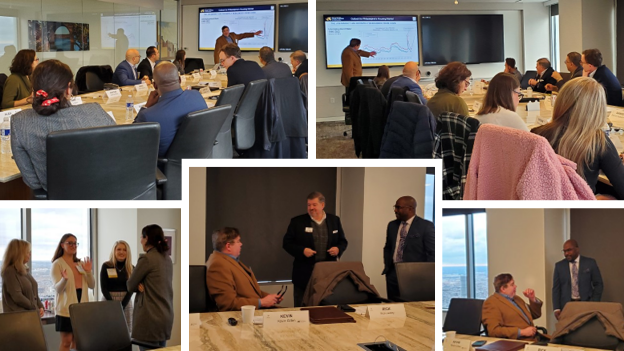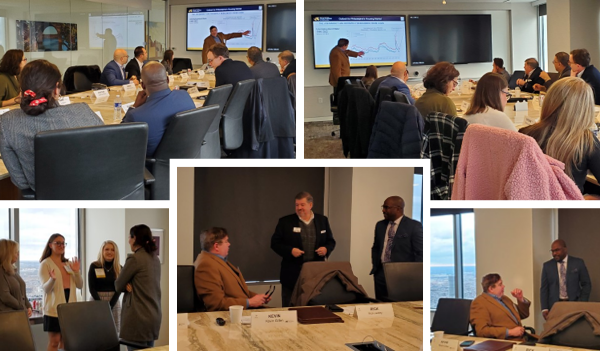June 2023 Philadelphia Mastermind Group Key Take Aways!
• PACE (Property Assessed Clean Energy) financing is a state legislated program that started in California and has spread to 32 states, including Pennsylvania. Designed to help owners make buildings more efficient and reduce carbon output. (David Oliverio – PACE Equity)
• Certain eligible improvements can be funded by private capital that is part of a private-public partnership. (David Oliverio – PACE Equity)
• PACE payments are made through the tax bill through a special property tax assessment. (David Oliverio – PACE Equity)
• PACE financing must have lender consent to be involved. Any lender with a mortgage on the property must agree in a lender consent document.. (David Oliverio – PACE Equity)
• Benefits of using PACE financing include being a long-term, low rate, non-recourse, mortgage free loan, helping to reduce effective cost of capital, helping to bridge a gap in financing now that interest rates are higher, able to be pre-paid or assumed at any time, can never be accelerated for any reason (even non-payment), helping to avoid equity and dilution, reducing personal risk, increasing NOI and property rate, amortization up to 30 years, and assumable upon sale. (David Oliverio – PACE Equity)
• PACE legislation was enacted in 32 states and many more are considering it. (David Oliverio – PACE Equity)
• Florida, California, Ohio, and Wisconsin have the most favorable legislation. Maryland and Illinois have more restrictions that can be limiting. (David Oliverio – PACE Equity)
• Can fund all hard and soft costs relating to roofing, windows, insulation, HVAC, elevators, escalators, some exterior shell assets, electric and plumbing – up to 30% of the stable value of the project. (David Oliverio – PACE Equity)
• Can also fund wastewater management, which is a big issue in Philadelphia. (Stephen Arrivello – PACE Equity)
• They can also help with cost overruns during construction, which has been an issue during this higher inflationary period. (David Oliverio – PACE Equity)
• PACE money stays in the project long term. It carries the same rights as the actual tax bill. Anyone who takes over the parcel someday will continue the payments. (David Oliverio – PACE Equity)
• PACE financing is attractive for hotels because there is often a gap in financing. (David Oliverio – PACE Equity)
• There are 87 steps to execute PACE, but PACE Equity handles the entire process. (David Oliverio – PACE Equity)
• Recently introduced a new fund called Cirrus Low Carbon for developers looking for higher efficiency. Cirrus has additional requirements over and above the standard fund (David Oliverio – PACE Equity)
• Multi-family was not originally included in the legislation, due to a legislative snafu. Can go back and recapitalize deals going back 2 years, but multi-family can only go back to September 2022. (Stephen Arrivello – PACE Equity)
• In a new construction project, there is typically plenty of additional spend when calculating soft costs. Biggest limiting factor isn’t usually the asset spend but rather they are more typically limited by NOI. (David Oliverio – PACE Equity, Stephen Arrivello – PACE Equity)
• Philadelphia does have some tweaks to the legislation, but does not require prevailing wage. It does require a letter that there is diversity in the workforce. (Stephen Arrivello – PACE Equity)
• PACE Equity handles the process of getting lender consent. (Stephen Arrivello – PACE Equity)
• Timelines differ depending on location and the needs of the project, but 90-100 days is typical. (David Oliverio – PACE Equity)
• PACE Equity has not yet closed on a condo, but there is a current project in Cincinnati. It’s not as favorable, but can be done. (David Oliverio – PACE Equity)
• Has been a grind with the way the market is going, especially in the office market. (Ed Opall – EisnerAmper)
• Some deals are still getting funded and coming out of the pipeline. (Max Silver – Silver Property Investments)
• Sellers have gotten more realistic with their pricing. (Max Silver – Silver Property Investments)
• Seeing a trend, especially with deals in European Markets, is the use of assurance groups to come up with ESG-related metrics. (Sean Pulsifer – Ballinger)
• There are stage 1, 2, and 3 environmental metrics that need to be reported. Stage 3 deals with supply chains for companies providing products or services. (Sean Pulsifer – Ballinger)
• Carbon / ESG related requirements used to be more of a “carrot” and offered something to be used in marketing, but recently has shifted to more to the “stick” approach. (Sean Pulsifer – Ballinger)
• Have seen projects stopping in their tracks. (Craig Bryson- Pennoni Associates)
• Life sciences market has been saturated. Office market is not healthy for new development. (Craig Bryson- Pennoni Associates)
• Continue to remain busy due to public spending on projects, which has quadrupled recently. (Craig Bryson- Pennoni Associates)
• Staffing remains an issue, though are seeing more resumes for entry level – 3 years. Some people may be hesitant to hire younger staff. (Craig Bryson- Pennoni Associates, Jim Karmolinski – Kelly Maiello Architects, Joseph Viturello – PernaFrederick Commercial Real Estate)
• Continue to be busy, though inflation remains an issue. (Jim Karmolinski – Kelly Maiello Architects)
• Preservation Alliance Awards highlighted some really impressive things going on in Philadelphia. (Jim Karmolinski – Kelly Maiello Architects)
• Lots of last minute asks in deals. (Joseph Viturello – PernaFrederick Commercial Real Estate)
• There is activity and there are leases happening, though less and less construction. Looking to take advantage of what’s already there. (Joseph Viturello – PernaFrederick Commercial Real Estate)
• It’s a tough time in the office market. They remain busy, but in part because it’s taking longer to get deals done. (Matt Frederick – PernaFrederick Commercial Real Estate)
• Getting payment for deals and dealing with special servicers and lenders has been difficult. (Matt Frederick – PernaFrederick Commercial Real Estate)
• Pennoni Associates provides energy audits for the C-PACE program. (Vincent Pennoni – Pennoni Associates)
• Working with building owners to help them meet tune-up requirements in Philadelphia and expecting to see more. (Vincent Pennoni – Pennoni Associates)
• Interesting space right now in construction. Projects are slowing or getting off to slow starts. (Michael Mostochuk – EisnerAmper)
• Supply chains are still a struggle, though contractors have learned how to deal with the issues. Some types of lumber are down significantly, but steel and concrete remain high. Lots of monopolies in the supply chain.. (Michael Mostochuk – EisnerAmper, Max Silver – Silver Property Investments)
• Ballard Spahr has done a 3 day per week mandate. Before it was just highly encouraged. Has been met with mixed reviews. (Sara McCormick – Ballard Spahr)
• Younger people want to come in and partners and senior level staff want to come in, but the middle group (who often have young children at home) are more resistant. (Jim Karmolinski – Kelly Maiello Architects)
• Difficult assessing younger associates without having them in the office, though some industries have found new ways to figure that out. (Stephen Arrivello – PACE Equity, Sara McCormick – Ballard Spahr)
• Could see a slow down coming in the 4th quarter. (Pam Arms – Columbia Bank)
• Recent banking issues have been very disruptive to lending. (Pam Arms – Columbia Bank)
• Interest rates of 6-7% aren’t that expensive in the larger picture, but people under the age of 40 don’t know what a normalized rate environment is. Balance has yet to come back into place. (Pam Arms – Columbia Bank)
• Doesn’t feel as bad as 2008. (Pam Arms – Columbia Bank)
• Some people are feeling a little worried about the industrial market, but she disagrees. Starting to see pushbacks in some areas where people don’t want all the trucks in their backyard. (Pam Arms – Columbia Bank)
• Banks learned a lot of lessons in 2008, so they’re asking for more verification. (Pam Arms – Columbia Bank)
• In regards to the I-95 collapse, one advantage is it was a newer section so it was already designed. Because of the volume of traffic, it will have federal money behind it. (Craig Bryson- Pennoni Associates)






Recent Comments